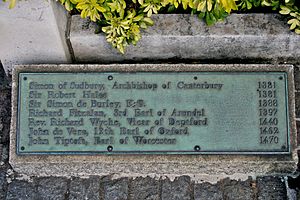John de Vere, 12th Earl of Oxford
| John de Vere | |
|---|---|
| Earl of Oxford | |

Site of scaffold on Tower Hill where John de Vere, 12th Earl of Oxford, was executed
|
|
| Spouse(s) | Elizabeth Howard |
|
Issue
Sir Aubrey Vere
John de Vere, 13th Earl of Oxford Sir George Vere Sir Richard Vere Thomas Vere Isabel Vere Joan Vere Mary Vere |
|
| Noble family | De Vere |
| Father | Richard de Vere, 11th Earl of Oxford |
| Mother | Alice Sergeaux |
| Born |
23 April 1408 Castle Hedingham, Essex |
| Died | 26 February 1462 (aged 53) Tower Hill, London |
John de Vere, 12th Earl of Oxford (23 April 1408 – 26 February 1462), was the son of Richard de Vere, 11th Earl of Oxford (1385?–15 February 1417), and his second wife, Alice Sergeaux (1386–1452). A Lancastrian loyalist during the latter part of his life, he was convicted of high treason and beheaded on Tower Hill on 26 February 1462.
John de Vere, 12th Earl of Oxford, born 23 April 1408 at Hedingham Castle, was the elder son of Richard de Vere, 11th Earl of Oxford, and his second wife, Alice, the widow of Guy de St Aubyn, and daughter of Sir Richard Sergeaux of Colquite, Cornwall by his second wife, Philippe (d. 18 May 1452), the daughter and co-heiress of Sir Edmund de Arundel. Through their second son, Sir Robert Vere, the 11th Earl and his wife, Philippe, were the great-grandparents of John de Vere, 15th Earl of Oxford.
The 12th Earl inherited his title as a minor at his father's death on 15 February 1417. Custody of his person and lands was granted firstly to the Duke of Exeter until his death in 1426, and later to the Duke of Bedford. In 1425, while still underage, Oxford married the heiress Elizabeth Howard (c.1410–1473/4), the daughter of Sir John Howard, 7th Lord Plaiz (c.1385/6–1409), a brother of Sir Robert Howard, father of John Howard, 1st Duke of Norfolk. After the death of her grandfather, Sir John Howard of Wiggenhall (c. 1366 – 17 November 1436), Elizabeth inherited lands in Norfolk, Suffolk, Essex and Cambridgeshire. Although Oxford claimed the marriage had been contracted on Exeter's advice, it had not been authorized by licence from the King, and Oxford was fined £2000. According to Castor, Oxford had difficulty making payment of this large fine since 'the earldom of Oxford was among the poorest of the comital titles', with Oxford stating in 1437 that his lands were worth only £500 per year.
...
Wikipedia
